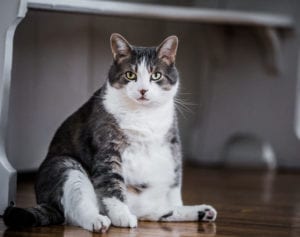An Extra Pound or Two: How to Help Your Cat Lose Weight
Feline obesity is a major concern for veterinarians, but even a little extra weight can negatively impact a cat’s quality of life.
To prevent major health problems, such as high blood pressure, urinary tract problems, heart disease, diabetes, cancer, fatty liver disease, and osteoarthritis, it’s critical to maintain your cat’s weight. With constant demands for snacks between meals or decreased activity, this can be much easier said than done.
Helping your cat lose weight doesn’t have to be impossible, and with our tips, you can all but guarantee them a longer, happier life.

The Long View
Some pets are predisposed to weight gain. Age, lifestyle, and diet are factors, but genetics play a role, too. Over 40% of North America’s pet population is considered obese, which is defined as being 15-20% over ideal body weight. Most cases are simply explained by overfeeding.
To know if your pet is overweight or obese, it is recommended to visually grade them with a Body Condition Score. A healthy cat will have easily palpable ribs, a clearly defined waist, and minimal fat. A cat that scores a 7-9 on the BCS will have obvious fat pads, a rounded abdomen, and no waist.
How Did This Happen?
Cats typically gain weight over a period of time. If you can prevent weight gain from gaining a foothold, your pet may enjoy a longer, healthier life. However, if they consume more calories than they expend on a daily basis, those extra calories are stored as fat. Cats that put on weight can have a harder time shedding pounds than cats that simply stay the ideal weight over time.
Can Your Cat Lose Weight?
It is definitely possible to help your cat lose weight, but it is an effort  requiring dedication and patience. The basic approach involves adjusting food portions, but it’s also crucial that they receive the right food as well. We can help you find the right product for your cat that not only reduces calories, but supports other health challenges, if applicable.
requiring dedication and patience. The basic approach involves adjusting food portions, but it’s also crucial that they receive the right food as well. We can help you find the right product for your cat that not only reduces calories, but supports other health challenges, if applicable.
It is essential to properly measure your cat’s meals, but cutting calories too abruptly can have negative consequences. You may be more successful if you separate your overweight cat from other animals in the household, to minimize food sharing or stealing. To keep their hunger at bay, try to spread their meals throughout the day.
Troubleshooting
It’s not uncommon for cat owners to give in to begging. However, try to encourage your cat to play or exercise instead. If you do treat them, be sure to subtract from their daily meal calories.
Exercise is the Key
To help your cat lose weight, it’s important that they lose fat while retaining lean muscle mass. Once calories are restricted you can focus on encouraging more exercise. Installing a catio is a good start, but they should enjoy at least 10 minutes of vigorous exercise a few times a week. Gradually you can increase their routine to 15 minutes twice a day, or 30 minutes daily. This will increase their metabolic rate while keeping muscles toned.
Keep On Checking
It won’t happen overnight, but you should start to see progress over a few months. Check your cat’s weight regularly and record it. If they aren’t losing weight from month to month, we can work together to modify their weight loss plan.
Please let our veterinarians and staff members know if you have further questions or concerns. We’re always here for your cat at Schertz Animal Hospital.
Share This Article
About
Schertz Animal Hospital
Since 1976, Schertz Animal Hospital has offered the greater San Antonio area outstanding pet care. Our state-of-the-art animal hospital in Schertz, TX compliments our stress-free handling and experienced veterinary staff. Make an appointment online or give us a call at (210) 659-0345 today!
